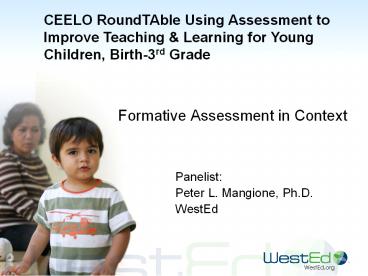Formative Assessment in Context - PowerPoint PPT Presentation
Title:
Formative Assessment in Context
Description:
CEELO RoundTAble Using Assessment to Improve Teaching & Learning for Young Children, Birth-3rd Grade Formative Assessment in Context Panelist: Peter L. Mangione, Ph.D. – PowerPoint PPT presentation
Number of Views:262
Avg rating:3.0/5.0
Title: Formative Assessment in Context
1
Formative Assessment in Context
CEELO RoundTAble Using Assessment to Improve
Teaching Learning for Young Children, Birth-3rd
Grade
- Panelist
- Peter L. Mangione, Ph.D.
- WestEd
2
Learning and Development
- begins in relationships, is informed by
relationships, and is stimulated by relationships
3
Formative AssessmentConsiderations for the
Birth-to-5 Age Range
- Learning is integrated
- Need to support both learning and development
- Emotional security in close, caring relationships
is foundational - Exploration and play are central in learning
- Spontaneous, responsive interactions are
critically important - Qualitative shifts in learning and development
- Young children become increasingly able to learn
from guided instruction as they develop
4
Formative Assessment
- Helps shape a students learning by
- Eliciting evidence of learning
- Interpreting the evidence to illuminate a
students learning needs - Using interpretations of evidence to adjust
instruction to meet a students needs (Black
Wiliam, 1998)
Orland, M., Anderson, J. (April 2013).
Assessment for learning What policymakers should
know about formative assessment. San Francisco
WestEd.
5
Kinds of Adjustments Based on Formative
Assessments in ECE Settings
- Contexts for Learning and Development
- Interactions/Conversations
- Environment
- Routines
6
Formative Assessment
- Ranges from
- Informal to formal
- Responsive to planned
- Brief to extended
Orland, M., Anderson, J. (April 2013).
Assessment for learning What policymakers should
know about formative assessment. San Francisco
WestEd.
7
Formative Assessment in ECE Settings
- Embedded in educational program
- Ongoing Observation and Documentation
(observation notes, photos, videos,
audio-recording, childrens products) - Reflection on documentation and reflective
curriculum planning based on observation/documenta
tion - Reflection done both individually and
collaboratively (importance of collaborative,
reflective dialogue, family engagement)
8
Formative Assessment in ECE Settings
- Focus on
- Individual child
- Learning in small groups
- Learning in the large group (preschool,
particularly older preschoolers)
9
Interim/Benchmark Assessments
- Periodic measures of student progress toward
achieving performance objectives
10
Formative Assessment Combined with
Interim/Benchmark Assessments
- Use observation/documentation as data in the
completion of periodic comprehensive
developmental assessments (5 Essential Domains of
School Readiness) - Periodic comprehensive developmental assessments
provide qualitative information on the childs
level of functioning (defined along learning
progressions) across developmental domains
11
- Periodic developmental assessments
- Allow for monitoring the progress of individual
children - Help teachers understand and interpret childrens
learning, development and behavior - Facilitate long-range planning for individuals,
small groups, and large group
12
Thank You































